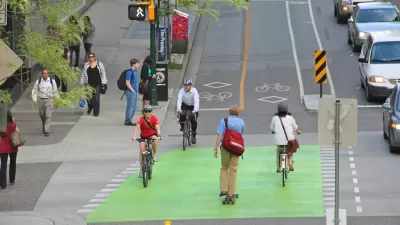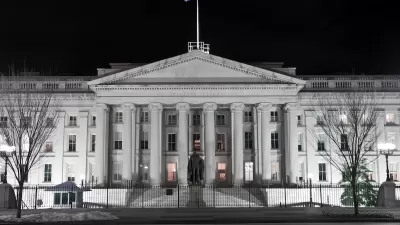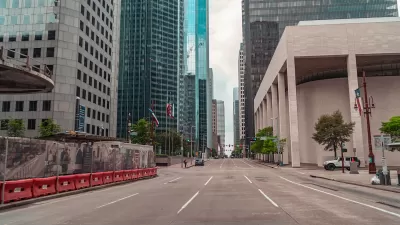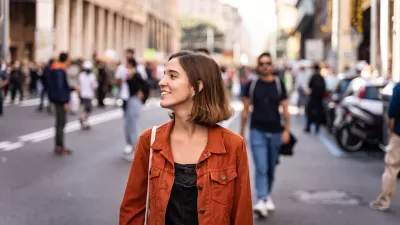Cities designed for one type of mobility - the car - result in residents impaired by multiple types of ailments. To create a happier and healthier city, the solution is to facilitate many ways of getting around, especially alternatives to the auto.

"Is urban design really powerful enough to make or break happiness?" asks Charles Montgomery. "The question deserves consideration, because the happy city message is taking root around the world. 'The most dynamic economies of the 20th century produced the most miserable cities of all,' [former Bogota mayor Enrique] Peñalosa told me over the roar of traffic. 'I'm talking about the US Atlanta, Phoenix, Miami, cities totally dominated by cars.'"
Montgomery goes globetrotting in search of the secrets of the world's happiest cities. And what, did he find, do happy cities share in common? They've found ways to facilitate travel by means other than automobiles.
"Why would travelling more slowly and using more effort offer more satisfaction than driving? Part of the answer exists in basic human physiology. We were born to move. Immobility is to the human body what rust is to the classic car. Stop moving long enough, and your muscles will atrophy. Bones will weaken. Blood will clot. You will find it harder to concentrate and solve problems. Immobility is not merely a state closer to death: it hastens it."
FULL STORY: The secrets of the world's happiest cities

Study: Maui’s Plan to Convert Vacation Rentals to Long-Term Housing Could Cause Nearly $1 Billion Economic Loss
The plan would reduce visitor accommodation by 25,% resulting in 1,900 jobs lost.

Alabama: Trump Terminates Settlements for Black Communities Harmed By Raw Sewage
Trump deemed the landmark civil rights agreement “illegal DEI and environmental justice policy.”

Why Should We Subsidize Public Transportation?
Many public transit agencies face financial stress due to rising costs, declining fare revenue, and declining subsidies. Transit advocates must provide a strong business case for increasing public transit funding.

Paris Bike Boom Leads to Steep Drop in Air Pollution
The French city’s air quality has improved dramatically in the past 20 years, coinciding with a growth in cycling.

Why Housing Costs More to Build in California Than in Texas
Hard costs like labor and materials combined with ‘soft’ costs such as permitting make building in the San Francisco Bay Area almost three times as costly as in Texas cities.

San Diego County Sees a Rise in Urban Coyotes
San Diego County experiences a rise in urban coyotes, as sightings become prevalent throughout its urban neighbourhoods and surrounding areas.
Urban Design for Planners 1: Software Tools
This six-course series explores essential urban design concepts using open source software and equips planners with the tools they need to participate fully in the urban design process.
Planning for Universal Design
Learn the tools for implementing Universal Design in planning regulations.
Smith Gee Studio
Alamo Area Metropolitan Planning Organization
City of Santa Clarita
Institute for Housing and Urban Development Studies (IHS)
City of Grandview
Harvard GSD Executive Education
Toledo-Lucas County Plan Commissions
Salt Lake City
NYU Wagner Graduate School of Public Service





























